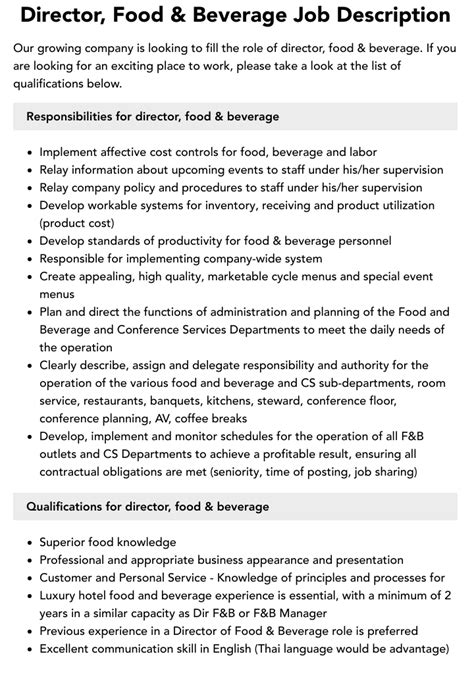The Complete Recipe for a Successful Food and Beverage Director
The Food and Beverage Director (F&B Director) is the culinary conductor of a hospitality establishment, orchestrating a symphony of delicious food, impeccable service, and satisfied guests. This role demands a unique blend of culinary expertise, business acumen, and leadership skills. This article will delve into the complete recipe for success in this demanding yet rewarding position.
Key Responsibilities: A Detailed Menu
The responsibilities of an F&B Director are multifaceted and extensive. They can be broadly categorized into several key areas:
1. Menu Planning and Development:
- Conceptualization & Creation: This involves researching current food trends, analyzing market demands, and crafting menus that resonate with the target audience while reflecting the establishment's brand identity. This includes considering dietary restrictions and allergies.
- Pricing Strategies: The F&B Director plays a crucial role in determining profitable pricing structures, balancing costs with market competitiveness and guest expectations.
- Cost Control & Inventory Management: Maintaining a tight rein on food costs is paramount. This involves meticulous inventory management, negotiating favorable supplier contracts, and minimizing waste.
2. Staff Management and Training:
- Team Leadership: The F&B Director leads a diverse team, including chefs, servers, bartenders, and kitchen staff. Effective communication, motivation, and delegation are essential for maintaining a high-performing team.
- Recruitment & Training: Identifying, hiring, and training skilled personnel is crucial for consistently delivering high-quality food and service. This includes ongoing training to enhance skills and knowledge.
- Performance Evaluation & Development: Regular performance reviews and constructive feedback are necessary for employee growth and overall team improvement.
3. Operational Efficiency and Service Excellence:
- Kitchen Management: Overseeing the efficient operation of the kitchen, including workflow, hygiene standards, and equipment maintenance, is critical for smooth service delivery.
- Service Standards: Setting and maintaining high standards for customer service, ensuring that all staff adhere to protocols and consistently deliver exceptional guest experiences.
- Quality Control: Ensuring consistent quality in both food preparation and service delivery is paramount. This involves regular taste tests, monitoring customer feedback, and addressing any issues promptly.
4. Financial Management and Reporting:
- Budgeting & Forecasting: The F&B Director is responsible for developing and managing the department's budget, forecasting revenue, and controlling expenditures.
- Profitability Analysis: Regular analysis of financial data is essential for identifying areas for improvement and maximizing profitability.
- Reporting & Compliance: Providing regular reports to upper management on key performance indicators (KPIs) and ensuring compliance with all relevant regulations.
Secret Ingredients for Success: Soft Skills and Beyond
Beyond the core responsibilities, certain soft skills and additional attributes contribute significantly to the success of an F&B Director:
- Strong Communication Skills: Effective communication is critical for coordinating with staff, suppliers, and management.
- Problem-Solving Abilities: The ability to quickly and effectively address challenges and resolve issues is essential in a fast-paced environment.
- Creativity & Innovation: Developing innovative menu items and service approaches keeps the establishment fresh and competitive.
- Adaptability & Flexibility: The ability to adapt to changing circumstances and guest demands is crucial for success in this dynamic role.
The Garnish: Continuous Improvement and Professional Development
Staying at the forefront of the culinary world requires continuous learning and adaptation. The F&B Director should actively seek opportunities for professional development, such as attending industry events, pursuing certifications, and staying abreast of current culinary trends and best practices.
By following this recipe, aspiring and current Food and Beverage Directors can cultivate the skills and expertise needed to create a thriving and successful food and beverage operation, consistently delivering exceptional experiences for guests and maximizing profitability for the establishment.
